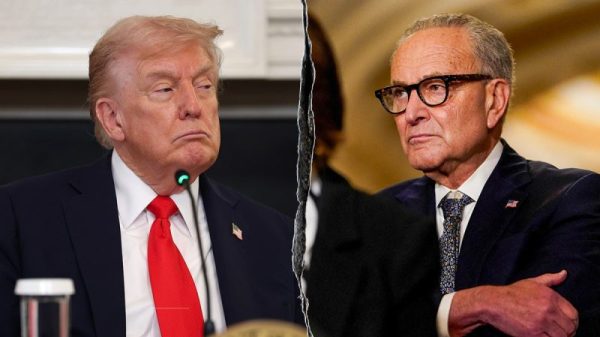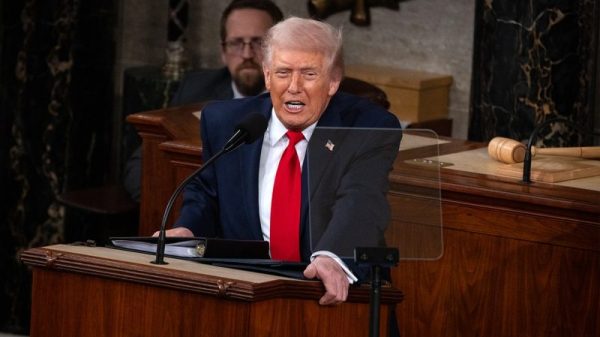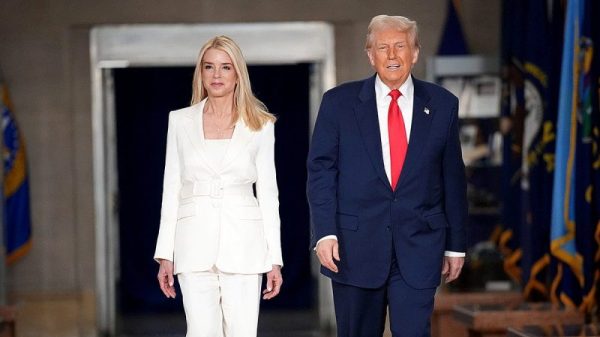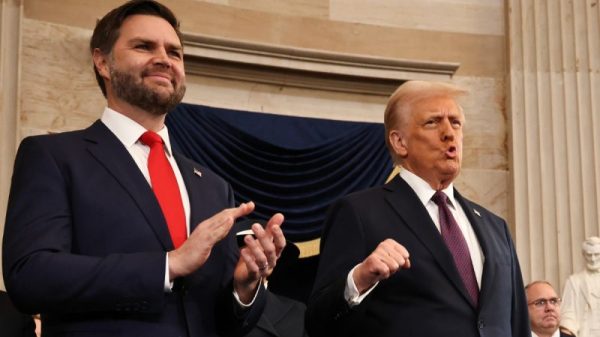The jury in former president Donald Trump’s Manhattan criminal trial continued to deliberate Thursday, with a verdict possible at any moment.
And as we await that crucial decision, efforts to pre-spin the verdict by Trump and his allies have kicked into high gear.
But as has long been the case, many of their complaints about the process are either false or lack important context.
Below we look at five of the most recent claims calling into question New York Supreme Court Justice Juan Merchan’s actions or questioning the fairness of the trial.
“Judge in Trump case in NYC just told jury they don’t have to unanimously agree on which crime was committed as long as they all at least pick one.” — Sen. Marco Rubio (R-Fla.) on Wednesday
New York Supreme Court Justice Juan Merchan “is not requiring a unanimous decision on the fake charges against me” — Trump on Wednesday
This was the big talking point Wednesday, spurred by an X post from a Fox News host.
It’s highly misleading — at best.
As The Washington Post’s Philip Bump and Devlin Barrett noted, Merchan didn’t say the jury doesn’t need to be unanimous on which crimes Trump committed. The thing they needn’t be unanimous on is something different: the unlawful means Trump used to affect the 2016 election.
It’s complicated. But basically: Falsifying business records — the crime alleged in the 34-count indictment against Trump — is normally a misdemeanor. But it can be charged as a felony if the falsification of the records is used to cover up another crime or the intent to commit another crime.
Prosecutors identified three such crimes that could serve as the unlawful means. Merchan said jurors need not agree on which of the three apply.
Importantly, even Trump’s lawyers acknowledged that’s how things usually work.
“Do you agree that’s not ordinarily required?” Merchan asked Trump lawyer Emil Bove last week.
“Certainly,” Bove responded.
Bove argued that Merchan should nonetheless exercise discretion and require unanimity, citing how this is an “extraordinarily important case.” But Merchan agreed with prosecutors that Trump should be treated like other defendants.
(Some allies, like South Dakota Gov. Kristi L. Noem (R), have even argued that Merchan’s decision violates Supreme Court precedent in 1999’s Richardson v. United States, which required unanimity for underlying violations. But that case dealt with a specific federal statute, not state law or even all federal law. And the Supreme Court previously recognized, in Schad v. Arizona, the “long-established rule that a jury need not agree on which overt act, among several, was the means by which a crime was committed.”)
“In many cases, the judge will actually give the jury a written copy of their instructions, but since he failed to do that in this case …” — Katie Cherkasky, a frequent legal pundit on Fox News, on Wednesday
“I’ve tried many jury trials in my day. You give jurors paper instructions every time. … This is an illicit, witch-hunt prosecution.” — Missouri Attorney General Andrew Bailey (R) on Wednesday
This objection seeped in late Wednesday, after the jury asked in a note to the judge that jury instructions be read to them again.
How could Merchan not give them a copy of the extensive and complicated instructions?
It’s a valid issue to consider — and one that legal minds have debated for years. But it’s also a matter of law in New York, where juries are generally not given a copy of the instructions because it’s not explicitly authorized by law. They can be given them if the defense consents, but Trump’s team doesn’t appear to have pressed the issue.
“The way it works in New York for as long as I’ve been a lawyer [is that] the court does not provide written jury instructions, period,” longtime Manhattan public defender Eliza Orlins said. “Occasionally with consent from the defense, they will do so. But that puts the conviction at risk.”
Orlins noted that defendants can attempt to withdraw consent, complicating matters.
Cheryl Bader of Fordham University law school in New York added: “In New York the default position is not to provide written instructions to the jury. The thinking behind that policy is not to have jurors be so focused on the court’s written legal instructions that it distracts them from the evidence and testimony.”
“We had the leading election expert in the country, Brad Smith, ready to testify. [Merchan] wouldn’t let him do it.” — Trump on Wednesday
“He wouldn’t even allow the defense to call a witness that would have shown what a sham and total waste of time this entire trial is.” — Republican National Committee co-chair Lara Trump, Donald Trump’s daughter-in-law, on Thursday morning
Merchan “did not want the most important expert witness, the former commissioner of the Federal Election Commission, who knows the laws very well. The Judge would not allow him.” — Rep. Dan Meuser (R-Pa.) last week
Merchan would have allowed Trump’s lawyers to call Bradley Smith to testify if they wanted. He just limited what Smith could talk about, including restricting him from interpreting federal campaign finance law. So they didn’t call Smith.
New York law limits expert testimony to when “the subject matter is beyond the knowledge or understanding, or will dispel misconceptions, of a typical finder of fact.”
Merchan’s decision on this front has some precedent. Smith was previously barred from providing such testimony in two other cases in Manhattan: the 2023 Sam Bankman-Fried case and a 2014 case.
“A lot of key witnesses were not called. … Why didn’t they call those witnesses? They didn’t call them, because they would have been on our side.” — Trump on Wednesday
“You have a lot of big players — very big players — that would have solved their problem or actually would have given us the win.” — Trump on Wednesday
These comments appeared to reference former longtime Trump Organization chief financial officer Allen Weisselberg, among others. Weisselberg, after all, is a key figure in Trump’s finances who prosecutors say was present at the crucial and disputed Trump Tower meeting that included former National Enquirer executive David Pecker and former Trump lawyer Michael Cohen. His absence from the trial is conspicuous.
But prosecutors didn’t call Weisselberg in part because he recently pleaded guilty to perjury in a separate Trump-related case — lying in a way that favored Trump. They also sought to emphasize that Weisselberg’s lucrative severance agreement with Trump bars him from voluntarily cooperating with any investigation.
But the main point is this: Trump’s lawyers were allowed to call witnesses, too. And they didn’t call Weisselberg. Similarly, they could have called any other witnesses that would have been on Trump’s “side” or given him the “win.”
They called just one witness. And it didn’t go particularly well.
“We have talked about, did the defense at some point [Tuesday] just decide it’s not worth objecting anymore. Because we’re drawing attention to the fact that this judge is overruling nearly everything that we’re trying to do … A judge has enormous impact on a trial.” — Fox host Shannon Bream on Wednesday
“The judge overrules every objection from the defense and sustains every objection from the prosecution.” — Fox host Jesse Watters on Tuesday night
Merchan did not overrule every defense objection on Tuesday. A review of the transcript shows he sustained about one-third of them. He sustained more of the prosecution’s objections, but that doesn’t take into account the substance of the objections.
The jury in former president Donald Trump’s Manhattan criminal trial continued to deliberate Thursday, with a verdict possible at any moment.
And as we await that crucial decision, efforts to pre-spin the verdict by Trump and his allies have kicked into high gear.
But as has long been the case, many of their complaints about the process are either false or lack important context.
Below we look at five of the most recent claims calling into question New York Supreme Court Justice Juan Merchan’s actions or questioning the fairness of the trial.
“Judge in Trump case in NYC just told jury they don’t have to unanimously agree on which crime was committed as long as they all at least pick one.” — Sen. Marco Rubio (R-Fla.) on Wednesday
New York Supreme Court Justice Juan Merchan “is not requiring a unanimous decision on the fake charges against me” — Trump on Wednesday
This was the big talking point Wednesday, spurred by an X post from a Fox News host.
It’s highly misleading — at best.
As The Washington Post’s Philip Bump and Devlin Barrett noted, Merchan didn’t say the jury doesn’t need to be unanimous on which crimes Trump committed. The thing they needn’t be unanimous on is something different: the unlawful means Trump used to affect the 2016 election.
It’s complicated. But basically: Falsifying business records — the crime alleged in the 34-count indictment against Trump — is normally a misdemeanor. But it can be charged as a felony if the falsification of the records is used to cover up another crime or the intent to commit another crime.
Prosecutors identified three such crimes that could serve as the unlawful means. Merchan said jurors need not agree on which of the three apply.
Importantly, even Trump’s lawyers acknowledged that’s how things usually work.
“Do you agree that’s not ordinarily required?” Merchan asked Trump lawyer Emil Bove last week.
“Certainly,” Bove responded.
Bove argued that Merchan should nonetheless exercise discretion and require unanimity, citing how this is an “extraordinarily important case.” But Merchan agreed with prosecutors that Trump should be treated like other defendants.
(Some allies, like South Dakota Gov. Kristi L. Noem (R), have even argued that Merchan’s decision violates Supreme Court precedent in 1999’s Richardson v. United States, which required unanimity for underlying violations. But that case dealt with a specific federal statute, not state law or even all federal law. And the Supreme Court previously recognized, in Schad v. Arizona, the “long-established rule that a jury need not agree on which overt act, among several, was the means by which a crime was committed.”)
“In many cases, the judge will actually give the jury a written copy of their instructions, but since he failed to do that in this case …” — Katie Cherkasky, a frequent legal pundit on Fox News, on Wednesday
“I’ve tried many jury trials in my day. You give jurors paper instructions every time. … This is an illicit, witch-hunt prosecution.” — Missouri Attorney General Andrew Bailey (R) on Wednesday
This objection seeped in late Wednesday, after the jury asked in a note to the judge that jury instructions be read to them again.
How could Merchan not give them a copy of the extensive and complicated instructions?
It’s a valid issue to consider — and one that legal minds have debated for years. But it’s also a matter of law in New York, where juries are generally not given a copy of the instructions because it’s not explicitly authorized by law. They can be given them if the defense consents, but Trump’s team doesn’t appear to have pressed the issue.
“The way it works in New York for as long as I’ve been a lawyer [is that] the court does not provide written jury instructions, period,” longtime Manhattan public defender Eliza Orlins said. “Occasionally with consent from the defense, they will do so. But that puts the conviction at risk.”
Orlins noted that defendants can attempt to withdraw consent, complicating matters.
Cheryl Bader of Fordham University law school in New York added: “In New York the default position is not to provide written instructions to the jury. The thinking behind that policy is not to have jurors be so focused on the court’s written legal instructions that it distracts them from the evidence and testimony.”
“We had the leading election expert in the country, Brad Smith, ready to testify. [Merchan] wouldn’t let him do it.” — Trump on Wednesday
“He wouldn’t even allow the defense to call a witness that would have shown what a sham and total waste of time this entire trial is.” — Republican National Committee co-chair Lara Trump, Donald Trump’s daughter-in-law, on Thursday morning
Merchan “did not want the most important expert witness, the former commissioner of the Federal Election Commission, who knows the laws very well. The Judge would not allow him.” — Rep. Dan Meuser (R-Pa.) last week
Merchan would have allowed Trump’s lawyers to call Bradley Smith to testify if they wanted. He just limited what Smith could talk about, including restricting him from interpreting federal campaign finance law. So they didn’t call Smith.
New York law limits expert testimony to when “the subject matter is beyond the knowledge or understanding, or will dispel misconceptions, of a typical finder of fact.”
Merchan’s decision on this front has some precedent. Smith was previously barred from providing such testimony in two other cases in Manhattan: the 2023 Sam Bankman-Fried case and a 2014 case.
“A lot of key witnesses were not called. … Why didn’t they call those witnesses? They didn’t call them, because they would have been on our side.” — Trump on Wednesday
“You have a lot of big players — very big players — that would have solved their problem or actually would have given us the win.” — Trump on Wednesday
These comments appeared to reference former longtime Trump Organization chief financial officer Allen Weisselberg, among others. Weisselberg, after all, is a key figure in Trump’s finances who prosecutors say was present at the crucial and disputed Trump Tower meeting that included former National Enquirer executive David Pecker and former Trump lawyer Michael Cohen. His absence from the trial is conspicuous.
But prosecutors didn’t call Weisselberg in part because he recently pleaded guilty to perjury in a separate Trump-related case — lying in a way that favored Trump. They also sought to emphasize that Weisselberg’s lucrative severance agreement with Trump bars him from voluntarily cooperating with any investigation.
But the main point is this: Trump’s lawyers were allowed to call witnesses, too. And they didn’t call Weisselberg. Similarly, they could have called any other witnesses that would have been on Trump’s “side” or given him the “win.”
They called just one witness. And it didn’t go particularly well.
“We have talked about, did the defense at some point [Tuesday] just decide it’s not worth objecting anymore. Because we’re drawing attention to the fact that this judge is overruling nearly everything that we’re trying to do … A judge has enormous impact on a trial.” — Fox host Shannon Bream on Wednesday
“The judge overrules every objection from the defense and sustains every objection from the prosecution.” — Fox host Jesse Watters on Tuesday night
Merchan did not overrule every defense objection on Tuesday. A review of the transcript shows he sustained about one-third of them. He sustained more of the prosecution’s objections, but that doesn’t take into account the substance of the objections.





















